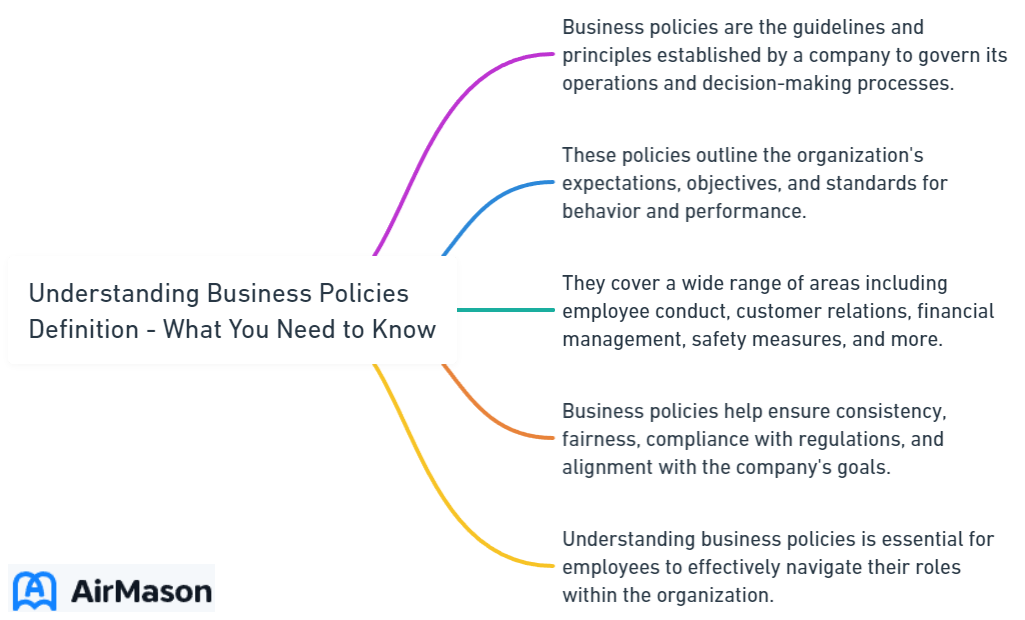
Are you aware of the impact well-defined business policies have on the success of your organization? Dive into this comprehensive guide to understanding business policies definition, their role in decision-making, and the key features of effective policies. Learn how to distinguish between business policy and strategy, and how aligning policies with organizational goals can pave the way to success. So buckle up and let’s explore the fascinating world of business policies!
Key Takeaways
- Business policies provide a framework and guidelines for decision-making within an organization, aiding in communication, coordination, motivation and management of external factors.
- Key features of effective business policies include clarity, specificity, flexibility & stability. Inclusivity & simplicity. Distinguishing between policy and strategy.
- Business policies are essential to successful attainment of organizational objectives by enhancing communication/coordination among personnel while managing legal liabilities.
Exploring Business Policy Definition
Business policy encompasses the guidelines developed by an organization, defining the limits within which decisions are taken by subordinates. These guidelines play an instrumental part in the organization’s success and significantly influence the decisions affecting the organization made by lower level management. From top level management to the lower level management, business policies address the significant issues affecting organizational success and provide clarity for decision-making.
Grasping the elements of a company policy is vital for augmenting its influence on the organization. These features include:
- Precision
- Clarity
- Dependability
- Suitability
- Simplicity
- Inclusivity
- Adaptability
- Stability
We’ll now delve into a thorough explanation of business policy and its role in decision-making within the business environment.
Business Policy: A Comprehensive Explanation
A business policy is a set of guidelines that define the parameters within which personnel at a subordinate level can make decisions and address problems, keeping in mind the present organizational goal. It is a wide-ranging concept that covers:
- The duties and obligations of top-level management
- The major issues impacting organizational success
- The judgments impacting organizations in the long-term
Furthermore, business policy plays a pivotal role in enhancing communication and coordination, as well as motivating employees and managing external influences and legal risks. The rationale behind business policy is to provide guidance and direction to personnel, to ensure uniformity in decision-making, and to safeguard the organization from legal liabilities, while strategy deals with the plan of action employed to reach the desired goals.

The Role of Business Policy in Decision-Making
The role of business policy in decision-making is to:
- Empower lower-level managers to solve problems independently, thereby enhancing the efficiency and effectiveness of the organization’s operations
- Set the direction, define the boundaries, and establish the rules for decision-making processes
- Ensure that decisions are made in a systematic and logical fashion
Business policy serves as the foundation for strategy, providing the framework and guidelines for the formulation of strategic decisions that are in line with the overarching goals and objectives of the organization. In a nutshell, business policies play a pivotal role in:
- Improving communication and coordination within the organization
- Providing guidance and motivation to employees
- Managing external factors and legal liabilities.
Key Features of Effective Business Policies
For optimal effectiveness, the features of business policy should exhibit the following characteristics in business policies:
- Precision
- Clarity
- Reliability
- Appropriateness
- Simplicity
- Inclusiveness
- Adaptability
- Stability
These characteristics contribute to effective and efficient running, better communication, coordination, and employee satisfaction within the organization.
We’ll now analyze each of these features in greater depth.
Clarity and Specificity
Clear business policies are pivotal for enhancing communication and coordination among employees. The significance of having a well-defined policy is to forestall any misinterpretations when adhering to the policy. A specific and definite policy prevents any potential issues when putting it into effect.
Having well-defined and precise business policies aids in enhancing communication and coordination among personnel, prevents misapprehensions in adhering to the policy, and prevents difficulties in implementation. In short, clarity and specificity in business policies are vital for smooth operations within an organization.

Flexibility and Stability
An effective business policy must strike a balance between flexibility and stability. A policy should offer flexibility in its application, allowing line managers to use it in recurring situations. It is also crucial to have a reliable and uniform policy to ensure that subordinates are able to adhere to it efficiently.
Moreover, a stable policy ensures that those consulting it are not subject to indecisiveness or uncertainty. A well-balanced policy that adapts to changing circumstances while maintaining consistency is essential for the organization’s success.
Inclusivity and Simplicity
Inclusivity and simplicity are of paramount importance in business policies. By fostering inclusivity, companies guarantee equal opportunities and cultivate a diverse and inclusive working atmosphere. Simple policies facilitate communication, comprehension, and uniformity within the organization.
Organizations can achieve inclusivity and simplicity in their business policies by using clear language, avoiding complex jargon, and providing multiple ways for employees to understand and access the policy. A comprehensive policy that is inclusive and simple will greatly contribute to the organization’s success.
Distinguishing Between Business Policy and Strategy
Understanding the difference between business policy and strategy is crucial, given their distinct roles within an organization. Business policy provides guidance and direction for decision-making, while strategy is a plan of action for attaining organizational objectives.
To better understand the difference between these two concepts and their respective roles, let’s explore their definitions and relationships further.
Business Policy vs. Strategy: Definitions and Roles
Business policy can be defined as:
- A set of guidelines and principles that direct the decision-making process within an organization
- Outlining the overall direction and goals of the business
- Serving as a framework for making strategic decisions.
On the other hand, strategy outlines the plan of action to realize the objectives established by the organization and is employed to traverse the parameters set by business policy. The correlation between business policy and strategy is that business policy establishes the framework and guidelines for decision-making within an organization, while strategy formulation is the plan of action to attain predetermined goals and objectives.
In essence, both concepts collaborate within middle level management to accomplish the organizational activities and objectives of the organization.

The Relationship Between Business Policy and Strategy
The connection between business policy and strategy lies in the collaboration between the two concepts to accomplish the objectives of the organization. Business policy furnishes the general direction and goals of the business, while strategy is the approach to attain those goals.
By collaborating, business policies and strategies can assist organizations in achieving their goals and objectives more efficiently and effectively. In a nutshell, business policy and strategy are interrelated concepts that play crucial roles in the success of an organization.
The Importance of Business Policies in Organizations
If explicitly stated, business policies offer a multitude of benefits to the management. They enhance the assurance of line managers as they can make decisions within a particular framework, eliminating the need to consult with senior managers on a regular basis and reducing the need for stringent supervision. Furthermore, clearly defined policies attempt to remove any personal speculation or prejudice.
Business policies play a critical role in organizations by providing structure, promoting compliance, improving efficiency, fostering accountability, and guiding decision-making. Let’s explore the specific benefits of business policies in enhancing communication and coordination, motivating and guiding employees, and managing external factors and legal liabilities.
Enhancing Communication and Coordination
By establishing a set of protocols and procedures for employees to follow, business policies can enhance communication and coordination within the organization. They also specify how tasks should be assigned, deadlines should be established, and information should be disseminated.
By providing a comprehensive policy for communication and coordination, organizations can increase efficiency and decrease the possibility of errors or delays. In short, well-defined business policies serve as the foundation for effective communication and coordination within an organization.
Motivating and Guiding Employees
By setting clear expectations, ensuring fairness, recognizing achievements, providing career advancement opportunities, and encouraging employee involvement, business policies can effectively motivate and guide employees. Some examples of policies that can help boost employee morale are, PTO policy, flexible working hour policy, health and wellness policy, etc. Policy provides line managers with the autonomy to make decisions within the scope of the policy, which can bolster their confidence and motivation.
Regular review of policy is essential to ensure that current policies are applicable in the current context and to provide a means of predicting future conditions and scenarios, assisting in determining how to address them. By motivating and guiding employees, business policies contribute to a more engaged and productive workforce.
Managing External Factors and Legal Liabilities
Risk management, compliance, employee training and awareness, stakeholder communication, and continuity planning can be implemented to manage external factors and legal liabilities. Risk management is of great importance to organizations in order to recognize, appraise, and control potential risks that could affect their operations.
Compliance is of great importance to organizations to guarantee that they are adhering to all relevant laws and regulations, avoiding legal repercussions and sustaining a positive standing. By implementing these measures, organizations can effectively manage external factors and legal liabilities, ensuring smooth operations and long-term success.
Developing and Implementing Effective Business Policies
The development and implementation of effective business policies in an organization require a systematic approach that comprises the following steps:
- Identifying the need
- Researching and gathering data
- Defining objectives and scope
- Drafting the policy
- Reviewing and revising as needed
- Communicating and providing training
- Monitoring and evaluating
- Further reviewing and amending as necessary.
Let’s explore the strategic management process and the importance of aligning business policies with organizational goals.
The Strategic Management Process
The strategic management process involves several steps.
- Examining the internal and external environment
- Establishing objectives to provide guidance and focus for the organization
- Formulating strategies to devise plans to achieve the established objectives
- Employing strategies to execute the plans.
Appraising the outcomes in the strategic management process is to gauge the potency of the strategies and make modifications as required. By following this process, organizations can effectively formulate and implement business policies that contribute to their overall success.
Aligning Business Policies with Organizational Goals
For optimal effectiveness, it is vital to align business policies with the organization’s goals. An assessment of the current implementation of the policies and whether they are achieving the desired objectives can be used to analyze the current policies. Identifying deficiencies in areas where the current policies are not achieving the organizational objectives is a vital step in the process.
Policies may be reviewed and revised by evaluating the existing policies and making adjustments to guarantee that they are attaining the organizational objectives. By aligning business policies with organizational goals, organizations can ensure that their policies are effective in achieving the desired outcomes.
For small businesses, aligning business policies with organizational goals holds particular significance. These enterprises often operate with limited resources and face unique challenges in achieving their objectives. Therefore, a meticulous evaluation of policies for small business in the context of their specific goals and available resources becomes essential.
Small businesses should prioritize policies that directly contribute to their core objectives, such as cost-efficiency, customer satisfaction, and growth. Tailoring policies to suit the scale and nature of the business allows them to maximize their effectiveness and agility in a competitive landscape. This alignment ensures that every policy serves as a strategic tool to propel the small business towards its desired outcomes, helping them navigate challenges and seize opportunities effectively.
Summary
In conclusion, understanding business policies and their role in organizational success is essential for any organization. By exploring the comprehensive definition of business policy, the key features of effective policies, the relationship between business policy and strategy, and the significance of business policies in organizations, we have provided valuable insights to help you create and implement successful policies. Remember, well-defined business policies contribute to better communication, coordination, employee motivation, and overall success. It’s time to harness the power of effective business policies and propel your organization towards its goals!
Frequently Asked Questions
What is an example of a business policy?
Company policies such as employee conduct, dress code, attendance, and equal opportunity are all important aspects of a business.
Procedures outline the processes for dealing with potential policy breaches.
What is a business policy and its importance?
A business policy is a set of guidelines that determine which decisions can be taken independently by employees and which ones require managerial input or approval.
This ensures a more efficient workflow as managers are only consulted when absolutely necessary.
What is business policy and its types?
Business policy is a set of rules formulated by the top-level management to define a company’s fundamental beliefs, values and philosophy.
Examples include code of ethics, equal opportunity policy and sustainability policy.
What is the meaning of business policy?
Business policy is a set of principles and rules designed to direct operational decision making within an organization, stressing its rules, principles and values.
These principles and rules are designed to ensure that the organization is able to achieve its goals and objectives in an efficient and effective manner. They also provide guidance on how to handle various situations that may arise in the course of business operations.
What are the key features of effective business policies?
Effective business policies must be precise, clear, reliable, suitable, simple, inclusive, adaptable and stable to be effective.

